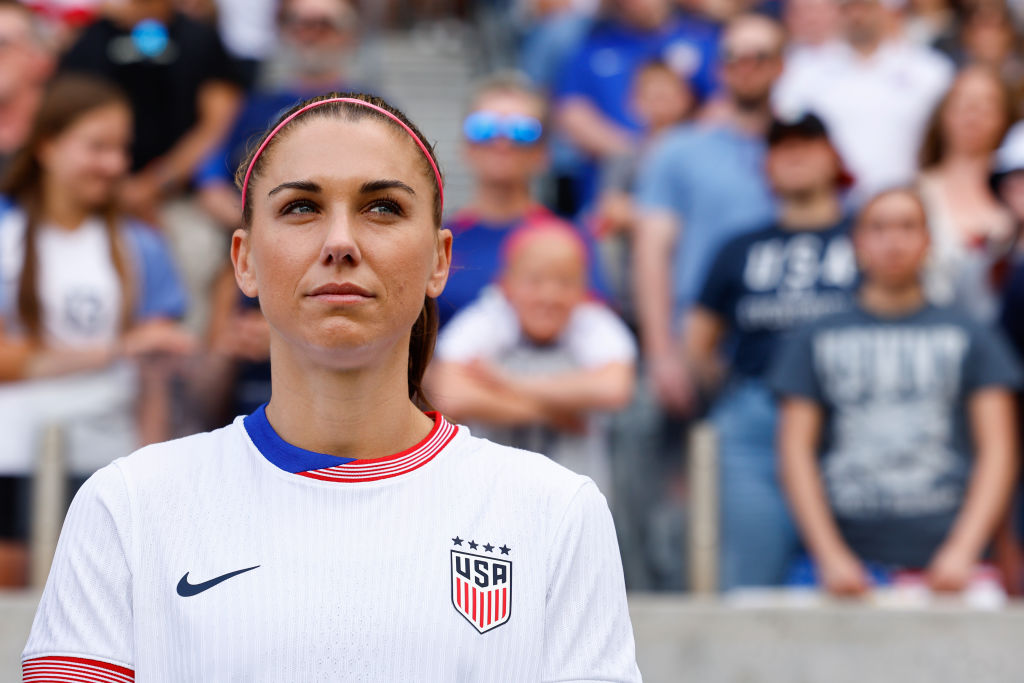The United States Women’s National Soccer Team (USWNT) just released its roster for the Paris Olympic Games. It’s here. Read it over once. Twice, even.
Your eyes are not deceiving you.
Alex Morgan is not on the team.
[time-brightcove not-tgx=”true”]
New USWNT coach Emma Hayes is leading the team into its first global competition in her tenure, and she’s certainly making a statement. Morgan, who along with recently-retired Megan Rapinoe, has been one of the leading faces of U.S. women’s soccer for the past decade or more: she’s the USWNT’s all-time leading active goal scorer, and sits fifth on the all-time list. She helped lead the team’s high-profile, and ultimately successful, fight for equal pay.
This will be the first Olympic Games since 2008, in Beijing, where Morgan isn’t suiting up for the U.S.. She’s played in every World Cup for the USWNT since 2011.
(Morgan’s representative did not respond to a message from TIME seeking comment.)
Morgan took to Instagram Wednesday after the roster was released.
“Today, I’m disappointed about not having the opportunity to represent our country on the Olympic stage. This will always be a tournament that is close to my heart and I take immense pride any time I put on the crest. In less than a month, I look forward to supporting this team and cheering them on alongside the rest of our country. LFG”
Hayes’ decision will be debated for days, if not weeks leading up to the Olympics. Morgan is a superstar striker who’s more than proven herself over the years, and her experience and leadership serve as an asset to any team. But she’s had a slow start to her NWSL season: she missed more than a month with the San Diego Wave after she injured her left ankle on April 19, though she has returned. She scored for the USWNT against Argentina on Feb. 23: it was her first goal in a year for the national team. Morgan was held scoreless at last year’s World Cup, which ended in disappointment for USWNT with a penalty shootout loss to Sweden, in the Round of 16. It was the USWNT’s earliest World Cup exit ever.
Hayes is playing the long game, turning the page on the USWNT’s past accomplishments—back-to-back World Cup wins in 2015 and 2019—and building up a new generation of players for the 2024 Olympics and beyond.
The 18-player roster has an average age of 26.8, which is the fourth-youngest roster the USA has ever sent to the Olympics, and the youngest since 2008. The average age of the 2020 Olympic Team—the USWNT lost to Canada in semis of the Tokyo Games—was 30.8 years old.
NWSL scoring leader Sophia Smith, 23, made the team, as did Mallory Swanson, 26, whose injury before the World Cup in 2023 was devastating to the team’s effort to three-peat; it badly needed her scoring punch in Australia and New Zealand. Trinity Rodman, 22, and Morgan’s San Diego teammate Jaedyn Shaw, 19, also made the team as forwards, Morgan’s position. USWNT vet Crystal Dunn, a defender in past international competitions, is also listed as a forward, speaking to Hayes’ strategy. Olympic rosters are smaller than World Cup rosters: the games allow for 18 players, while 23 players can go to World Cups. Players who can play multiple spots, like Dunn, are particularly valuable. Morgan’s an up-front forward through and through.
Hayes tapped dependable veterans with 100 or more national team appearances, like midfielders Lindsey Horan, 30, a World Cup co-captain, along with Morgan, last year, and Rose Lavelle, 29. Alyssa Naeher, 36, returns in goal. Defenders Emily Sonnett, 30, and Tierna Davison, 25, return for their second Olympics: rounding out the squad are first-time Olympians Korbin Albert, Sam Coffey, Catarina Macario (midfield); Casey Murphy (goalkeeper); and Noami Girma, Casey Krueger, and Jenna Nighswonger (defenders).
The USWNT, which hasn’t won Olympic gold in a dozen years, kicks off its campaign on July 25, against Zambia in Nice, a day before the Opening Ceremonies. No Morgan. No Rapinoe.
A true new day in U.S. women’s soccer history.

